Model Answers to PYQs (2019-2024)
1] In what ways the functionalist approach in International relations help in maintaining peace and order in global politics? [2023/15m/200w/2b]
The functionalist approach, initiated by David Mitrany, focuses on the functional cooperation and integration of states, emphasizing the role of international organizations, institutions, and agreements in promoting peace and order in global politics.
Functionalism encourages states to collaborate on shared functional issues, such as trade, public health, and environmental protection. It suggests that by addressing common challenges, states can build trust and reduce the potential for conflict.
Functionalism advocates for the establishment of international organizations, like the United Nations (UN) and its specialized agencies, to facilitate cooperation and manage global issues. These organizations provide forums for dialogue, negotiation, and dispute resolution.
Economic cooperation and integration, as promoted by functionalist approaches, can lead to increased economic interdependence between states. When states have significant economic ties, they are less likely to engage in military conflicts that could disrupt those ties.
Functionalism supports efforts to transform conflicts into cooperative relationships. By identifying shared interests and common goals, states can move from confrontation to cooperation.
While the functionalist approach has its merits in promoting peace and order in global politics, it is not without criticisms. Critics argue that functionalism may oversimplify international relations by focusing too narrowly on cooperation and integration, sometimes neglecting power politics and security concerns.
Nevertheless, the functionalist approach remains a valuable perspective in the field of IR, particularly in addressing contemporary global challenges that transcend national borders. [227 words]
The post contains answers to the last 6-year papers i.e. (2024-2019). Answers to the previous year questions from 2013-2024 are a part of our book PSIR Optional Model Answers to PYQs (2013-2024). Click here to know more.


